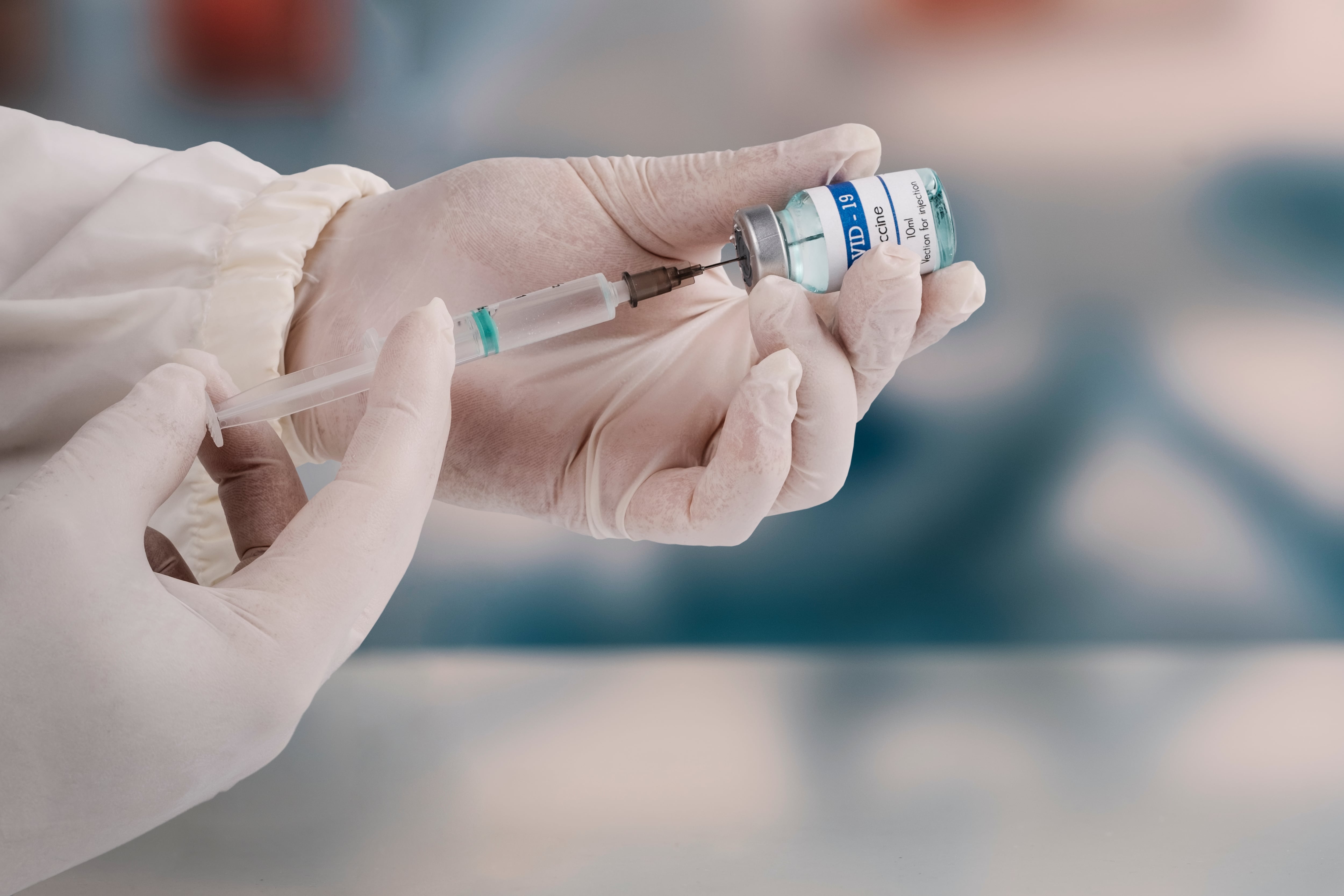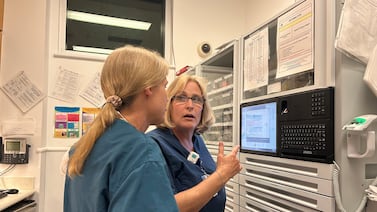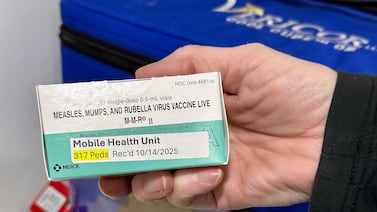Public health, explained: Sign up to receive Healthbeat’s free Atlanta newsletter here.
As Georgia Covid rates rise, people who want to get the latest vaccine as it hits pharmacy shelves over the coming weeks will likely face a new hitch: They’ll need a doctor’s prescription, at least for now.
Pharmacies became a key distributor of Covid shots during the pandemic, and many Georgians are used to getting annual flu and Covid shots there.
But uncertainty about how the federal government is regulating the newest Covid shots, which have been updated for the 2025-26 season and are starting to arrive in stores, has created a new wrinkle in that process.
Many pharmacies in Georgia said they will require a prescription for the shot until an influential federal committee meets and makes firm recommendations on who should get the vaccine, expected in September. Those pharmacies include CVS, as well as independent drugstores.
“Everyone will need a [prescription] until ACIP makes a recommendation,” said Dr. Johnathan Hamrick, a member of the board of directors of the Georgia Pharmacy Association who formerly taught pharmacy law at Mercer University and practices in metro Atlanta.
His colleague, Dr. Jonathan Marquess, who owns independent pharmacies and serves as vice president of the Academy of Independent Pharmacy for the state pharmacy association, agreed.
CDC panel’s actions could decide access to shots
All eyes are on ACIP: the Advisory Committee on Immunization Practices. It develops policies on vaccination in the United States as part of the Centers for Disease Control and Prevention. It’s set to meet Sept. 18 and 19 in Atlanta.
The committee’s policies help govern how pharmacists in Georgia and many other states administer vaccines.
Under Georgia law, if ACIP has approved a vaccine, pharmacists can typically administer it, as long as they have an agreement with a supervising doctor, which most pharmacies do.
If ACIP votes to recommend the Covid vaccine for certain or most populations in the United States, that would allow pharmacists to go back to providing the shots without a prescription, Hamrick said, although how that will work for different age groups and categories of people will depend on the exact details of the new recommendations.
It’s not clear how the committee will vote. Robert F. Kennedy Jr., secretary of the Department of Health and Human Services who has disrupted the vaccine system, dismissed the committee’s 17 members in June and appointed eight of his own picks, seven of whom remain.
Kennedy’s actions have drawn criticism and even lawsuits from professional medical societies, including the American Academy of Pediatrics and the Infectious Diseases Society of America. Medical professionals and public health experts have raised concerns that the committee will curtail its recommendations for the vaccine to only certain populations, stymieing widespread access.
This week, the Food and Drug Administration approved the latest version of the shot, but with more restrictions on who should get it than last year, raising questions about access. But Georgia pharmacists, and many others, are waiting to see what the ACIP does in September.
“That’s what we’re all waiting on,” Hamrick said.
Marquess, who owns several independent pharmacies in Georgia, said he has ordered the shots and expects them in soon.
In Georgia, as of last week, about 1.6% of emergency room visits were due to Covid, according to the latest data from the CDC, the highest rate since this time last year. And wastewater Covid levels have ticked up in Georgia from “very low” in mid-July to “moderate” as of last week, according to CDC data.
“Immunizations have been proven to be safe and effective and healthy to keep people [from getting] those terrible diseases,” Marquess said. During the most recent Covid season, from fall 2024 to spring 2025, only about 16% of Georgia adults got at least one shot, according to the CDC.
CVS, which has over 300 pharmacy locations in Georgia, has started receiving the new shots in stores, spokesperson Amy Thibault said. She did not directly answer a question about whether the chain had ordered fewer shots than last year but said it would have “ample supply” to meet the need.
People with a prescription will be able to get the shots at drugstores or at one of the company’s nearly 50 MinuteClinic locations in the state, Thibault said.
Representatives from Publix and Walgreens did not immediately respond to requests for information on how they are handling the shots.
To be determined: insurance coverage for shots
Marquess said the pharmacists who work for him would typically be willing to put in a quick call to a patient’s doctor to get the needed approval, obviating the need for an office visit.
Thibault of CVS said it would vary by location as to whether pharmacists would call a patient’s doctor for them, or the patient would need to reach out directly.
“It makes it much simpler for the whole medical system if we can utilize our protocol and not call every time to get a prescription,” Marquess said.
Hamrick said it’s unclear how insurers will handle the cost, though they typically cover the shots recommended by ACIP.
The latest Covid vaccine will cost about $225 out-of-pocket at CVS stores, Thibault said.
The updated vaccines are not yet available at county health departments, said Georgia Department of Public Health spokesperson Eric Jens. He said each county’s health department places its own orders, “typically based on need.”
“Covid vaccinations are administered at public health departments by nurses working under protocols established by DPH. DPH does not require a prescription for Covid vaccines,” Jens said. “At this time, DPH does not know what the cost of the updated Covid vaccine will be for individuals without insurance.”
Much of the confusion could be resolved when ACIP meets next month. But turmoil at the CDC, including the ouster of newly appointed Director Susan Monarez and the resignation of four senior officials citing political interference in the vaccine process, could affect the meeting.
U.S. Sen. Bill Cassidy, a Louisiana Republican who cast the deciding vote to confirm Kennedy as HHS secretary, this week called on ACIP to “indefinitely delay” its meeting.
“Serious allegations have been made about the meeting agenda, membership, and lack of scientific process being followed,” Cassidy said. “If the meeting proceeds, any recommendations made should be rejected as lacking legitimacy given the seriousness of the allegations and the current turmoil in CDC leadership.”
No matter what ACIP does, Georgia pharmacists may have a legal pathway to providing the shots without an individual prescription “under Georgia law pursuant to vaccine protocol agreements,” said Greg Reybold, general counsel and vice president of public policy for the American Pharmacy Cooperative.
Meanwhile, the pharmacists voiced concerns that people are growing tired of hearing about the politics of vaccines and confused by the dizzying array of policy changes.
“We have to untie health care from the politics,” Hamrick said.
“Less outbreaks, less severe complications, less hospitalizations, less death,” Hamrick said. Vaccines “keep people in the population healthier in the long run.”
Rebecca Grapevine is a reporter covering public health in Atlanta for Healthbeat. Contact Rebecca at rgrapevine@healthbeat.org.







